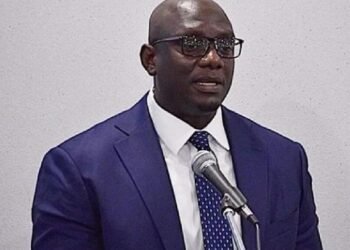The Confederation of African Football’s (CAF) decision to withdraw its approval for Ghana to use the Baba Yara Stadium in Kumasi for international matches has ignited public outrage and raised deep concerns about the state of sports infrastructure in the country.
This action stems from technical infractions, including a playing field that has been deemed unfit for hosting international matches.
The consequence is that Ghana currently lacks a single stadium fit to host an international CAF or FIFA match with several well-meaning Ghanaians questioning the country’s priorities, sparking a sharp public discourse on mismanagement, corruption, and misplaced investments.
Professor H. Kwesi Prempeh, the Executive Director of the Ghana Centre for Democratic Development (CDD-Ghana), in a scathing critique, underscored the irony in Ghana’s approach to public infrastructure, particularly the overemphasis on superficial branding at the expense of substantive results.
“When the branding is consistently better—way better—than the product it advertises to the whole world, eventually the truth will out,” Professor Prempeh wrote, drawing attention to a pattern where Ghana sells a polished image to the world while delivering subpar results.
The learned Professor lamented the country’s overinvestment in propaganda and underinvestment in the actual product, an approach that has left even flagship facilities like the Baba Yara Stadium unfit for international competition.

This situation has triggered widespread criticism, with many pointing fingers at key stakeholders within the National Sports Authority (NSA), the Ghana Football Association (GFA) and the Ministry of Sports.
The Irony of Ghana’s Sports Infrastructure
The timing of the CAF decision is particularly telling, as Ghana had recently invested a staggering $34 million to refurbish the University of Ghana Sports Stadium—a project that was reportedly 70% complete prior to the injection of funds.
Yet, a seasoned sports journalist Fentuo Tahiru Fentuo opined that the investment has produced a substandard facility incapable of meeting the basic standards set by the CAF.
“How can the leaders not see this simple fact and apply wisdom?”, Fentuo questioned, underscoring the failures of government and football officials to make good use of state resources.
What makes this situation even more alarming is the speculation that certain individuals within the GFA and the Ministry of Sports may actually benefit from the CAF’s decision to ban Ghana to use the Baba Yara Stadium.
Fentuo, in his incisive commentary, claimed that some officials at both the Sports Ministry and the Ghana Football Association might be quietly pleased by this outcome due to the opportunities it creates for profiteering.
According to him, the absence of a suitable home venue will necessitate the national football team to play its home matches abroad, leading to an increase in travel expenses that some officials might exploit for personal gain.
“Believe it or not, there are some people very happy that CAF has banned Ghana because they will be profiting big time from this. Per diems will now be paid in dollars; there’s no ruling out inflated costs for hotels and other miscellaneous associated with travel.
“Same goes for camping and training facilities that will have to be paid for because the team is not based in Ghana and can’t just train anywhere for free. Avenue to carry supporters (read foot soldiers) to this country in the name of supporting the team. Taxpayers’ money will be wasted on a needless venture, but someone profits from the contract of flying or busing these people there”.
Fentuo Tahiru Fentuo, a seasoned Sports Journalist
Fentuo firmly argued that these individuals stand to benefit enormously from the chaos and inconvenience that have outraged ordinary Ghanaians.

This narrative of profiteering in the face of national embarrassment resonates with many who see this as yet another instance of the insatiable greed of football and government officials.
The notion that public funds could be wasted on needless ventures while key infrastructure, such as the Baba Yara Stadium, remains underdeveloped is not just infuriating—it is emblematic of a broader problem of mismanagement and corruption in Ghana’s public sector.
For a country with a rich footballing history, the current predicament is a bitter pill to swallow. The decision by CAF serves as a harsh reminder that Ghana’s approach to sports infrastructure is woefully inadequate.
While Ghana boasts of its passion for football, the failure to maintain and upgrade its stadiums reflects a deeper malaise—a lack of accountability and a willingness to prioritize personal gain over national interest.
The public uproar over the CAF decision is a reflection of deeper frustrations with the way public resources are managed in Ghana.
The government’s failure to deliver a stadium fit for international competition, despite claims of significant investments, has opened the door to suspicions of corruption and profiteering.
As Professor Prempeh aptly noted, when the branding is better than the product, the truth eventually comes out.
And for Ghana, the truth is increasingly clear, and until the country prioritizes real results over “empty propaganda”, it will continue to suffer the consequences of mismanagement and greed.
READ ALSO: Elorm Aba Explains Criticisms Against Portia Asare’s ‘Juju’ Claims























